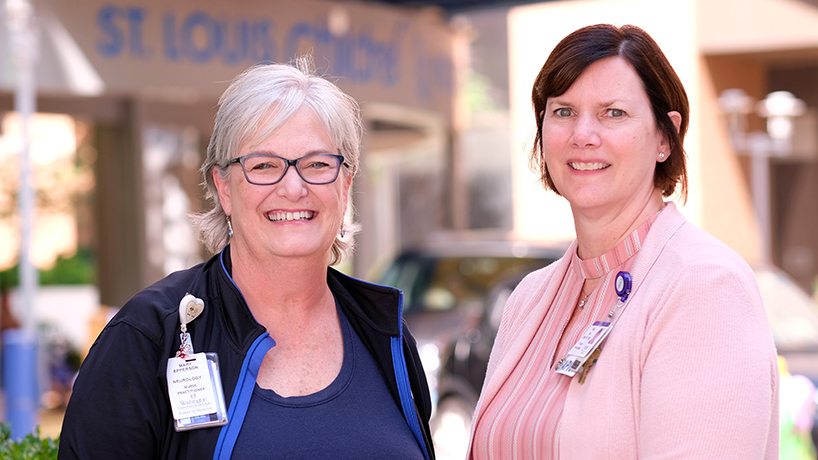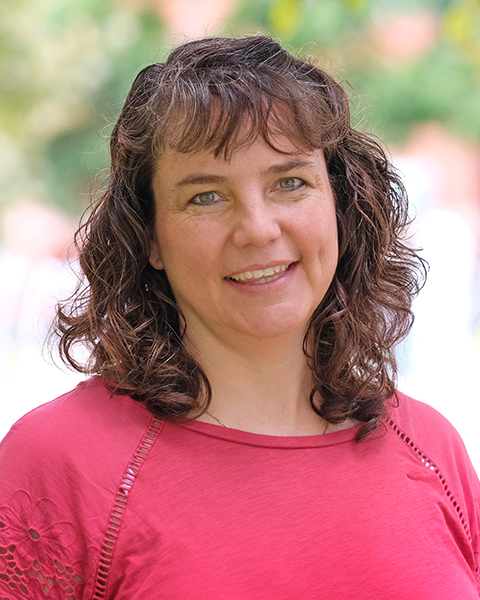College of Nursing alumnae Mary Epperson (left) and Pamela Piel were recipients of 2019 St. Louis Magazine Excellence in Nursing Awards. (Photos by August Jennewein)
Mary Epperson will tell you that she got where she is today by being a klutz.
She split her chin open two Good Fridays in a row. She bumped heads in the swimming pool, fell off her bike and tripped, hitting her head hard on concrete.
Thankfully, her skull made it, and so did the brain inside.
Those brain-rattling experiences helped the University of Missouri–St. Louis alumna develop the Washington University School of Medicine chronic concussion clinic, which got in on the ground floor of chronic traumatic encephalopathy and post-concussion syndrome treatment to provide the greater St. Louis community with cutting-edge care.
Epperson’s efforts for the people of St. Louis are both unique – based on her strengths and experiences as a pediatric neurology nurse practitioner – and iconic – exemplary of the invaluable care and value that College of Nursing graduates quietly provide every day to their patients.
This spring, St. Louis Magazine recognized the strengths of UMSL nurses by selecting three alumnae – Epperson, Margaret Bultas and Pamela Piel – for its annual Excellence in Nursing Awards, which were announced April 18 at a banquet at Windows on Washington and then in the magazine’s May issue.
The magazine’s selection committee narrowed down 220 submissions to 60 finalists, which included a plentitude of UMSL-educated nurses: Lisa Burnitt, Robyn Drake, Molly Figgemeier, Mia Glover, William Holt, Rebecca Light-Pearlman, Paula Lowery, Leonora Muhammad, Catherine Reese and Angela Williams.
The Excellence in Nursing Awards are intended to acknowledge the often unnoticed yet “remarkable efforts” and “selfless care, compassion, and service” of St. Louis-area nurses. In that spirit, here are the stories of UMSL’s three alumnae winners.
Finding an impact
Mary Epperson (BSN 2005, MSN 2008) for neurology/psychology/behavioral health
Epperson got her BSN for her mom.
A self-proclaimed “old-school” nurse, Epperson entered the field before the bachelor’s degree started becoming standard for hospitals.
“My mom wanted me be the best that I could. She had a dream for me,” Epperson said. “Some people stay in school because they love being in school. For me, it was a way to a goal, to be a better nurse, have other opportunities. I felt like there was so much more that I could do and see and know.”
After earning her bachelor’s in 2005, Epperson thought “what the heck, my house is already a mess” and went for her MSN.
While in school, she fostered two children with special needs. Balancing being a mom with school was tough, but support from classmates and instructors kept her afloat. She says the knowledge she gained in school helped her stay abreast of the medical field’s evolution.
After graduating, Epperson worked in primary care for several years before missing the connections she formed with patients in specialty care at St. Louis Children’s Hospital. She treasures the opportunity to affect lives daily.
“I’ve hugged parents that were losing their children,” Epperson said. “I’ve held kids’ hands and sang church songs as they’ve passed away. Then still went home and, while I was sad, I felt like I did something good. In nursing no matter how bad the day is, you can feel like you made an impact.”
Helping people help people
Margaret Bultas (MSN 2002, PhD 2010) for educator
St. Louis Magazine selected alumna Margaret Bultas, Saint Louis University professor and coordinator of the traditional BSN, as winner in the educator category.
Looking back at her career, Bultas is most proud of the balance she achieved.
The Saint Louis University associate professor and traditional BSN coordinator continued her education, developed a professional career in nursing and took on leadership opportunities all while spending every possible moment with her children and family.
Perseverance, she said, has been her key to success.
Earning her MSN then a PhD at UMSL required tenacity as well as a great deal of flexibility from the administration. Her professors were understanding of the demands presented by Bultas’ children – aged 4, 2 and less than 1 – and made accommodations so she could be successful.
That pliable attitude and understanding toward student life are things Bultas now provides to others.
“I learned those lessons early on because of how I was treated, and I learned to treat others like that,” Bultas said. “I’m very proud of my degrees from UMSL, and they have shaped me in ways that helped me be successful and helped me tremendously help the students that I work with now.”
Bultas began her nursing career in the adult intensive care unit then made her way to the pediatric ICU, where she discovered she enjoyed working with parents. She started triaging late-night parent queries on an answer call line and found it a rewarding experience.
That led to being a school nurse for seven years then, after earning her MSN, to adjuncting at a nursing school. A full-time faculty offer made her return for her PhD.
Now, Bultas helps prepare student nurses by coordinating SLU’s four-year curriculum and approximately 600 students. She’s found her passion there.
“The great joys of nursing are not – this is going to sound strange – when I help the patients, but when I can help somebody else help the patients,” she said. “I really enjoy helping people help people.”
Caring for families
Pamela Piel (MSN 2011) for hospice/home health/palliative care/long-term care
In pediatric palliative care, you’re not just caring for the child, explained Piel, a nurse practitioner on the Pediatric Advanced Care Team at St. Louis Children’s Hospital.
You’re caring for the entire family.
That’s a lesson Piel learned from then-Assistant Professor Dawn Garzon while working toward her MSN at UMSL.
“It helped me with more of the big-picture perspective and communication so that I could better serve these families,” Piel said. “Many times, families just go with what the physician may be saying. What they don’t realize is there’s all these choices, and our team helps the family kind of see that big picture and step back and see what’s important to them as a family to see if the decision is in line with their goals for their family and their child.”
While pursuing her UMSL degree, Piel worked in the pediatric and cardiac ICUs, where she stayed for 16 years. She found herself drawn to families needing extra support, which naturally led to palliative care.
Now, Piel works on an interdisciplinary team composed of physicians, nurse practitioners and a social worker. The members collaborate, respecting each other’s perspectives, which helps create a unique nonhierarchical structure.
Though she was honored to receive an award for her accomplishments, Piel was also grateful for the attention brought to pediatric palliative care, which is a relatively new and still-evolving concept.
“Unlike in the adult world, where palliative care is more focused on the end of life and how to make that adult as comfortable as can be, pediatric palliative care is more about a holistic family approach to care,” Piel said. “It’s not only about dying. It’s actually about living and living as well as possible for however long and continuing to foster hope for families that they are going to have more time.”
















